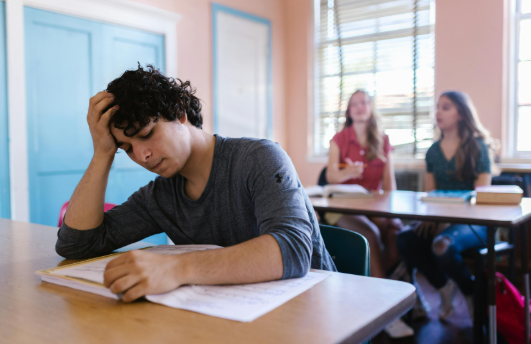As the spring season approaches, seniors are anticipating graduation. On May 29, the class of 2025 will officially conclude their experience as Woodhaven High School students – an emotional time for the majority. Nonetheless, that same majority is still actively fighting the desperation to be free from high school – whether it relates to the workload, people, or petty drama. Leading up to the ceremony, seniors from all schools often start to give in and then are forced to face the consequences in the grade book.
This tendency for most seniors to lose motivation is inevitable – especially through the final periods of the school year; this phenomenon has been commonly coined as “senioritis.” With plans of moving forward on the mind, senior students begin to slack on turning in assignments and avoid studying of any kind.
While some students are simply fighting academic burnout from years of endless workloads, most senior students have already committed to their college of choice by the time the school year ends. As a result of this, those specific seniors are often seen resorting to this relaxed, unmotivated mindset in which school work is no longer a top priority. Despite how tempting it is, this can be very harmful to the image of the student and could potentially interfere with their acceptance and any scholarships they received – depending on how prestigious the college is. Therefore, it is crucial that students do their best to get back on track to avoid extreme G.P.A. drops that could result in a reversal of their acceptance.
In addition to neglecting school work, many students just simply avoid coming to school as much as possible. Notably, the rising number of absences shares a direct relationship with the amount of assignments being turned in – as well as the quality of them.
As stated by Jaiden Manuel, a Woodhaven High School senior, “School has been so stressful for so long, especially on top of college stuff, so I’d rather just go home and sleep. Spring break did not feel long enough, so I’m looking forward to the senior skip days.”
Unfortunately, even if students are feeling “burnt out,” the problem only worsens the more they skip attending class. It becomes increasingly difficult to catch up once you’re behind, as the assignments add up quickly.
Moreover, students who have developed plans for the future seem more motivated in general. However, these seniors are ironically the ones who are more likely to give up on studies before graduation, as they are aware of the bigger, more exciting goals ahead to focus on. Students especially feel as if effort is pointless when their courses have no relation to their personal goals.
Nonetheless, students can give themselves necessary breaks when they know they do not have the motivation or time to complete a certain assignment to their best ability. Giving yourself time to recover and recharge mentally will serve more benefits than forcing yourself to turn in your absolute best work at all times. According to Southern New Hampshire University, to stay motivated, you must “plan an incentive for when you reach set milestones,” implying that rewards can be key in helping yourself push through.
With this, students understandably struggle, but there are ways to improve one’s state of mind in the meantime until graduation. By keeping a strict time schedule, students can manage their time in ways that balance both senior year fun and academic endeavors.





